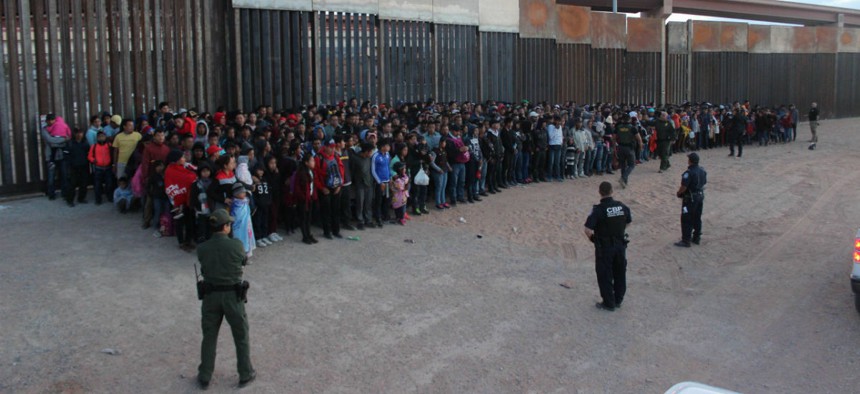
Border Patrol agents working in El Paso apprehend 1,036 illegal aliens in late May. U.S. Customs and Border Protection
Democrats Set Up Another Spending Fight By Proposing Not to Fund Border Wall or Agents
House spending bill would allow for hiring elsewhere in the Homeland Security Department.
House Democrats on Tuesday unveiled a plan to fund the Homeland Security Department in fiscal 2020, leaving out key Trump administration priorities and likely setting up another spending fight with the White House.
Democratic appropriators provided no money in their proposal for the hiring of Border Patrol agents or for any barriers along the U.S.-Mexico border, an issue that led to the longest-ever government shutdown late last year and into 2019. In his fiscal 2020 budget proposal, President Trump requested funding for the Border Patrol to hire 750 new employees and $8.6 billion for border wall funding.
The House Homeland Security Appropriations bill released Tuesday includes provisions “protecting against attempts by the Trump administration to steal funds from measures that actually keep us safe for a vanity border wall, and providing no funding for additional Border Patrol agents and checkpoints or border barriers,” said Rep. Nita Lowey, D-N.Y., chairwoman of the House Appropriations Committee.
The measure would provide $63.8 billion to DHS overall, a 4% increase over the current fiscal year but still less than Trump’s request. About $14 billion of that would go to Customs and Border Protection, including funding for 1,200 customs officers and more than 1,800 total new hires. DHS had requested funding for 1,000 new Immigration and Customs Enforcement agents, but the Democratic bill would not appropriate money for these hires.
Funding for Trump’s proposed wall along the southern border has been a sticking point since he took office, culminating in a 35-day shutdown that ended earlier this year. Congress has appropriated funding for replacement fencing and some additional barriers, but has declined to provide anywhere near the amount needed to enact Trump’s vision for the border. The president ended the shutdown after declaring a national emergency that would enable him to shift around $8.1 billion for wall construction.
The administration is facing several lawsuits over the emergency declaration. On Monday, a federal judge ruled that House Democrats did not have standing to bring such a suit against the White House. That followed a previous court ruling in California, however, that blocked DHS from moving forward with construction of wall segments.
The spending bill would require that “no federal funds may be used for the construction of physical barriers along the southern land border of the United States during fiscal year 2020.”
The administration is also facing headwinds on its efforts to staff up the Border Patrol, regardless of Congress’ funding decisions. Despite targeted efforts and a mandate from Trump that it hire 5,000 new agents, the agency has struggled for years to keep pace with rapid attrition. Border Patrol finally hired more agents than it lost in fiscal 2018, but netted just three employees in its southwest sector. CBP even signed a contract with Accenture worth up to $300 million to help ramp up hiring, but the agency was recently forced to cancel it “for convenience” after it failed to lead to any significant hiring.
Officials recently tapped other DHS offices to provide supplemental staffing to Border Patrol, noting that the likely disruption to normal operations was necessary to handle the historic increases in families coming across the border. The department is also seeking volunteers from throughout government to deploy to the border.
House lawmakers will take the summer to negotiate a compromise spending bill with the Republican-controlled Senate. Congressional leaders and the White House are still negotiating over a budget deal to raise governmentwide spending levels to avoid drastic cuts that would otherwise take effect under the 2011 Budget Control Act.
NEXT STORY: What Women’s Suffrage Tells Us About Empowerment







